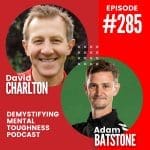
Sports Psychology Tips: Setting Goals
to Help Your Mental Health
Forming new helpful habits
At the time of reading this article you may be feeling overwhelmed by the way the Covid-19 situation has impacted on your personal or professional life. Your routine may have changed dramatically, some people may even be struggling to find a routine. Or you may be finding the going tough and feeling overly stressed and worried about the future.
These complaints are very common at present and can have a big impact on your levels of motivation. You may be in the mode of “I’ll do my run tomorrow” or perhaps you’ve got sloppy and have let your diet “go to pot”. Many parents who are home schooling might well be slipping into the habit of giving their children more screen time than they’d ideally like to.
When these types of behaviours slip into our daily lives it’s common for you to feel guilty or self-critical and let your negative self-talk take over. Perhaps you’ve been telling yourself: “I shouldn’t being doing that”, “I feel rubbish”, “I’m a terrible parent”, “I’m supposed to be an athlete, what am I doing” or “I wish I was able to get motivated, I’ve no energy”.
With thoughts like these, powerful emotions can come to the fore where you may take your frustrations out on loved ones who you may be living on top of right now. Your children or siblings may get it as you struggle to contain yourself. Or if you’re lucky enough to be working at present, your colleagues may be getting the brunt of your anger. You may even just sit stewing and find it difficult to express these emotions.
So how do you turn the corner?
Ideally, you want to be able to take control of this situation the best you possibly can and be on the front foot – approaching each day with energy and vigour.
To begin with, stop for a few minutes and ask yourself the following 3 questions:
- How motivated do I currently feel? Rate yourself on a scale of 1-10.
- How do I want to move forwards today and in the short term?
- What resources do I have available to me to do this?
Hopefully you’ve taken a few notes!
If not, go on and write a few things down. Get those moments of inspiration out on paper and let go of the negative thoughts, doubts and worries.
Now then – assuming you’ve made some notes and feel a little better. We’ll take a look at helping you feel more motivated.
Habit is defined as “a settled or regular tendency or practice, especially one that is hard to give up.”
Whilst commitment means “To what extent you make promises and the extent to which you will keep those promises.”
The questions above will have helped you think about how you can form some helpful habits, taking ownership of your time. Now we’re going to help you take things up another notch and COMMIT.
Goal setting is one of the most popular techniques used in Sports Psychology and research tells us that it can have a positive influence on the performance and well-being of athletes, if done well. Positive changes in levels of confidence and motivation, as well as reduced anxiety are some of the outcomes many athletes get from setting meaningful goals.
A goal is known as an “aim for action” – in the current climate there is a need for people to take action now, not tomorrow, if you want to rid yourself of the negative feelings and thoughts I discussed earlier.
What can you do?
This article will concentrate on the “here and now” and encourage you to set yourself some short-term goals so that you get yourself moving forwards more positively.
Step 1:
Ask yourself – what are my overall aims from creating some new helpful habits?
In my case, when I recently did this exercise it was to improve my mental health so that I felt better in myself, was more present and energised.
Step 2:
Now go ahead and set a maximum of 3 goals for the next 7 days. The goals can fall into the following categories.
- Performance goals – where you focus on improvements relative to past performances. (Eg. improving your 5k running time, lifting more weight than you did last week or increasing the number of reps or sessions)
- Process goals – this is linked to how you’d like to operate either during the day or in your sport or training. (Eg. you could look to rate yourself out of 10 each day and track things such as – how focused you were when you were working, the quality of your sleep, how healthy you ate, your rate of perceived exertion when you exercised, how calm and patient you were with the children, etc.)
- Fun goals – are the things that you want to do for no other reason than because you find it fun and enjoyable which might be exactly what you need at the moment (Eg. Fun goals could be taking up kickboxing, like I have in the last few weeks, gardening, baking or cooking, dancing, camping out in the garden with the children, having a relaxing bath, going for a run somewhere off the beaten track, watching a movie, etc.)
- Stretch goals – these are deliberately challenging or ambitious objectives and something that may not be right for some people at the moment, but for others this might be what they need to get them fired up and more energised.(Eg. Learning to play a musical instrument, training for a future marathon using your treadmill or in your back garden at the moment, getting up early at 0600am to make the most of the day, etc.)
My most recent goals for this week have been:
- Going running a minimum of 5 times this week (covering distances between 2-4 miles)
- Get to sleep before 1000am Monday to Friday
- Do at least 10 minutes of kickboxing every day
For maximum impact, take a look at this weekly goal setting sheet for some help and guidance following the SMART goal principles.
And feel free to email or message me with your goals for the week. I’m happy to help you feel you are accountable to someone. Or if it’s easier for you, tell your family or friends your goals for the week. Print them out and stick them on the fridge so that you don’t forget about them. Then keep at it for a minimum of 4 weeks to give yourself a great chance of developing some positive habits.
If you’d like to learn more about helping yourself during this challenging period why not sign up to the “The Mental Edge” where you’ll receive regular tips and advice.
Or to get in touch for one 2 one Sports Psychology Coaching with a Leading Sport Psychologist, David Charlton, based near Newcastle upon Tyne – Face to face, via the telephone, SKYPE or online via email available.

Best Wishes
David Charlton
Global Sports Psychologist who is located near Newcastle Upon Tyne, UK and willing to travel Internationally. David also uses online video conferencing software (Zoom, Facetime, WhatsApp) on a regular basis and has clients who he has supported in USA, Canada, South America, UAE, Australian and New Zealand.
Managing Director – Inspiring Sporting Excellence and Founder of The Sports Psychology Hub. With over 10 years experience supporting athletes, coaches, parents and teams to achieve their goals, quickly.
T: +44 7734 697769







